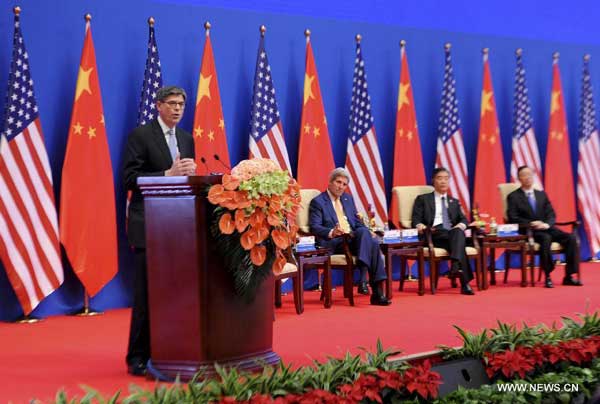China and the US geared early Wednesday for high-stakes talks on a slew of thorny issues, as American officials warned against rising tensions caused by Beijing’s “problematic” claim to swathes of the South China Sea.
The maritime disputes, as well as US fears over cybersecurity and Chinese hacking, were raised Tuesday in preparatory talks involving civilian diplomats as well as top military officers from both sides.
Areas of tension between the world’s two major economic powers were discussed in a “professional way”, said a senior State Department official, adding the tone was “quite positive,” and insisting the “relationship really is built on solid fundamentals.”
US Secretary of State John Kerry and Treasury Secretary Jacob Lew will discuss a “breadth of issues” with the Chinese team, led by State Councilor Yang Jiechi and Vice Premier Wang Yang, during the sixth-annual two-day Strategic and Economic Dialogue, which opens Wednesday.
China’s claim to the strategic South China Sea — also claimed in part by the Philippines and Vietnam, among others — is based on a line drawn on 20th century maps.
“The ambiguity associated with the nine-dash line is problematic,” another US official told reporters traveling aboard Kerry’s plane before he arrived.
China and its neighbors have stepped up patrols of disputed areas, and recent spats in the South China Sea have led to boats ramming each other, the use of water cannon and arrests of fishermen.
The heightened tensions are “very relevant to the United States as a Pacific power, as a major trading nation, as an important consumer of the sea lanes,” the senior US administration official said.
The US stresses it takes no sides in the disputes, but has accused Beijing of destabilizing acts and urged it to uphold freedom of navigation in the key waterways.
China has said it is committed to diplomatic, peaceful means to address the claims, the US official said. “We want China to honor that and live up to its word.”
– China listening? –
US officials on Tuesday raised the idea of a freeze on any further construction in the South China Sea, and insisted the Chinese side appeared to be listening.
But Chen Zeguang, China’s assistant foreign minister, had earlier blasted the US for “some wrong remarks and acts on maritime issues and cyber issues, bringing negative impact on bilateral relations.”
Kerry will also seek to persuade his Chinese counterparts to reinstate a cybersecurity working group cancelled by Beijing after the US indicted five Chinese military officers for hacking into US businesses — charges dismissed by China as “intentionally fabricated.”
As arguably the two largest users of cyberspace, “we share an interest in a secure, predictable and orderly cyber environment,” the US official said.
“We are committed to working with the US side to advance such a relationship,” Chen told reporters in Beijing.
“To achieve this objective, the most important thing is that we should not see confrontation or conflicts.”
Other issues high on the agenda include climate change, wildlife trafficking and a nuclear-armed North Korea, following a “significant” visit last week by Chinese President Xi Jinping to Seoul.
US and Chinese views on the need for Pyongyang to take “irreversible steps to denuclearize” showed “a steady convergence”, the US official said aboard the plane.
But while Beijing’s patience with the brinkmanship of its wayward, unpredictable ally appears to be wearing thin, it has not publicly shown any willingness to take action to rein in the regime.
Economic ties will also loom large in the talks, as they are “an important anchor for the over-arching bilateral relationship”, a senior US Treasury official said, highlighting that Lew had already met with several Chinese counterparts in Beijing.
America was continuing to work to “establish a more level playing field for American goods, services, workers and companies,” the Treasury official said.
US officials would press China to move more towards an economy based on household consumption, which will then “open up further to US goods and services” and be less dependent on exports and heavy industry.
Tuesday’s initial lower-level talks between military and civilian officials also included for the first time discussions about shared concerns on space security.
It was an initial attempt to try “to understand each other’s approach”, and the space track appears to “hold great promise for the future”, one US official said.










